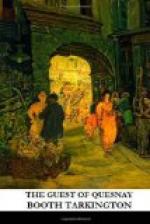“What is that?”
“About Mrs. Harman,” was the serious reply. “Elizabeth hasn’t a clue.”
“’Clue’?” I echoed.
“To Louise’s strange affair.” Miss Elliott’s expression had grown as serious as her tone. “It is strange; the strangest thing I ever knew.”
“But there’s your own case,” I urged. “Why should you think it strange of her to take an interest in Saffren?”
“I adore him, of course,” she said. “He is the most glorious-looking person I’ve ever seen, but on my word—” She paused, and as her gaze met mine I saw real earnestness in her eyes. “I’m afraid—I was half joking the other day—but now I’m really afraid Louise is beginning to be in love with him.”
“Oh, mightn’t it be only interest, so far?” I said.
“No, it’s much more. And I’ve grown so fond of her!” the girl went on, her voice unexpectedly verging upon tremulousness. “She’s quite wonderful in her way—such an understanding sort of woman, and generous and kind; there are so many things turning up in a party like ours at Quesnay that show what people are really made of, and she’s a rare, fine spirit. It seems a pity, with such a miserable first experience as she had, that this should happen. Oh I know,” she continued rapidly, cutting off a half-formed protest of mine. “He isn’t mad—and I’m sorry I tried to be amusing about it the night you dined at the chateau. I know perfectly well he’s not insane; but I’m absolutely sure, from one thing and another, that—well—he isn’t all there! He’s as beautiful as a seraph and probably as good as one, but something is missing about him— and it begins to look like a second tragedy for her.”
“You mean, she really—” I began.
“Yes, I do,” she returned, with a catch in her throat. “She conies to my room when the others are asleep. Not that she tells me a great deal, but it’s in the air, somehow; she told me with such a strained sort of gaiety of their meeting and his first joining her; and there was something underneath as if she thought I might be really serious in my ravings about him, and—yes, as if she meant to warn me off. And the other night, when I saw her after their lunching together at Dives, I asked her teasingly if she’d had a happy day, and she laughed the prettiest laugh I ever heard and put her arms around me—then suddenly broke out crying and ran out of the room.”
“But that may have been no more than over-strained nerves,” I feebly suggested.
“Of course it was!” she cried, regarding me with justifiable astonishment. “It’s the cause of their being overstrained that interests me! It’s all so strange and distressing,” she continued more gently, “that I wish I weren’t there to see it. And there’s poor George Ward coming—ah! and when Elizabeth learns of it!”
“Mrs. Harman had her way once, in spite of everything,” I said thoughtfully.




